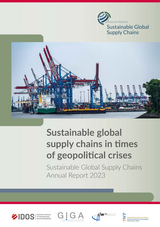Books

Sustainable global supply chains in times of geopolitical crises: Sustainable Global Supply Chains Annual Report 2023
Altenburg, Tilman / Jann Lay / Melanie Müller / Rainer Thiele (Network hosts)Books (2024)
Research Network Sustainable Global Supply Chains, Berlin: Stiftung Wissenschaft und Politik (SWP)
ISBN: 978-3-96021-227-0
DOI: https://doi.org/10.23661/r1.2024
Open access
In an era marked by interconnected global economies and rapid geopolitical shifts, understanding the intricate impacts of these developments on supply chains has become paramount. Interdisciplinary research on global supply chains offers a comprehensive lens through which we can unravel the complexities of global supply chains and understand current developments. The intricate linkages between geopolitics and supply chains become evident when considering the impacts of trade agreements, tariffs, and political instability on the movement of goods. Economists can analyze financial and economic repercussions, political scientists can assess the power dynamics of the actors involved in global supply chains, and environmental experts can evaluate the ecological footprint of these developments. By synthesizing these viewpoints, an interdisciplinary perspective not only paints a more comprehensive picture, but also identifies potential vulnerabilities and opportunities for innovation within supply chains. One critical aspect that demands attention is the increasing importance of sustainability in supply chains. As the global community grapples with the consequences of climate change and environmental degradation, the need for sustainable practices has never been more pressing. An interdisciplinary perspective, once again, plays a pivotal role by integrating environmental and social responsibility with economic viability to craft solutions that support political decision-makers in shaping the future of global supply chains. The Research Network Sustainable Global Supply Chains was initiated by the Federal Ministry for Economic Cooperation and Development (BMZ). It currently comprises about 100 internationally leading scientists from all over the world and is jointly coordinated by our four institutes. Its tasks are: to conduct and generate research that contributes to making supply chains more sustainable; and to collect and synthesize the best international research on this topic and make it accessible to policymakers and other societal actors. In addition to its own research, the network organizes academic conferences and discussions with policymakers and organizes a blog. With this second Annual Report, we highlight new research, provide a forum to debate controversial supply chain topics, and identify policy-relevant research gaps for the network’s future work. At the same time, the report is an invitation to participate inthe discussions on how investment, production, and trade will be reorganized in a global economy that has to respond to geopolitical challenges.
Contact
Cornelia Hornschild
Publication Coordinator
E-mail Cornelia.Hornschild@idos-research.de
Phone +49 (0)228 94927-135
Fax +49 (0)228 94927-130
Alexandra Fante
Librarian/ Open Access Coordinator
E-Mail Alexandra.Fante@idos-research.de
Telefon +49 (0)228 94927-321
Fax +49 (0)228 94927-130




![[Translate to English:] Photo: Alexandra Fante, Bibliothekarin/Open Access-Koordinatorin](/fileadmin/_processed_/f/0/csm__c_Deutsches-Institut-fuer-Entwicklungspolitik_Fante_94ce4fa1ba.jpg)